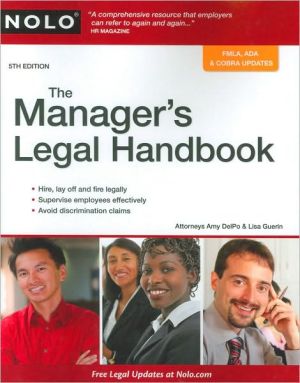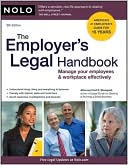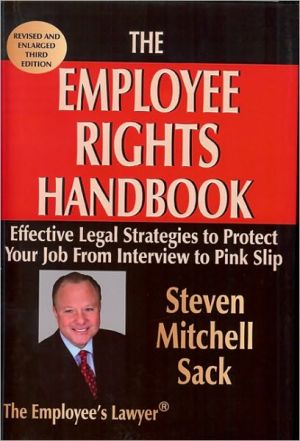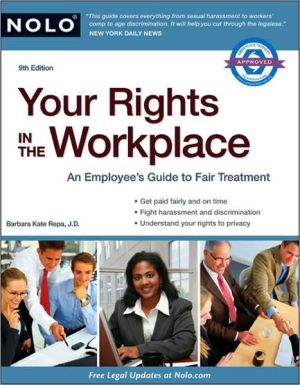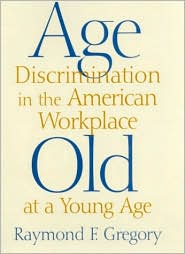The Manager's Legal Handbook
Supervise employees and independent contractors safely and legally with this quick reference to employment law, combining legal information and practical ideas in Nolo's plain-English format. The Manager's Legal Handbook includes answers to your employment questions including: frequently asked questions; lessons from the real world; dozens of resources, online and off
Search in google:
The quick reference to employment law for anyone who oversees workers.Whether you're managing workers or working in the HR department, The Manager's Legal Handbook is the perfect introduction to supervising employees and independent contractors safely and legally.Need some information about overtime? Want some useful ideas on workplace policies? Have a question about trade secrets and need the answer now? This one-of-a-kind book provides everything you need to stay within the bounds of the law.The 5th edition is completely overhauled to provide quick answers to the questions that managers encounter every day. It includes updated 50-state legal charts and new sections on setting pay and communicating with employees. Reference & Research Book News A guide to the legal aspects of supervising employees and contractors . . .
Introduction\ \ Hiring can be a tough task for managers. It's challenging enough to find the right hire for the job-someone with the skills, attitude, personality, and other important qualities to be a success at your company. When you add legal concerns to the mix, hiring can seem like a truly daunting responsibility.\ \ But you cannot ignore your legal obligations when hiring new employees. Federal and state employment laws reach beyond just current employees; many also protect those who apply for jobs by, for example, prohibiting discriminatory job postings, putting limits on the information you can gather in a background check, or outlawing certain kinds of applicant screening tests. What's more, the things you say and do during the hiring process could come back to haunt you and your company later, particularly if an employee claims that you offered a job contract or promised job security.\ \ The good news is that following sensible and careful hiring practices will keep your company out of immediate legal trouble, help you find the most qualified employees, and-by screening out problem employees from the get-go- help prevent management headaches and possible lawsuits down the road.\ \ This chapter explains the legal ins and outs of hiring, including practical advice on how to find, interview, and seal the deal with your lucky new hire.\ \ Do I have to advertise open positions?\ No. Although federal, state, and local governments typically have to post openings, private companies don't. Nonetheless, there are some very good reasons to advertise: \ \ \ \ You can choose from a larger pool of applicants, which increases your odds of findinga great person for the job.\ \ \ You avoid unintentional discrimination. (For example, if you rely solely on word of mouth when looking for applicants and you only know people of your race or ethnicity, then your hiring process may be discriminatory- even though that is not your intention.)\ \ \ You can avoid the appearance of nepotism or favoritism. If you hire your friends, family members, or neighbors to come work for you, the employees who currently report to you may think you'll play favorites. By posting open positions and choosing your hires from a broad range of applicants, you can show your reports that you hire-and manage-on merit alone. (For advice on effective and legal job advertisements, see "Advertisements," below.)\ \ \ \ \ \ Are there questions I cannot ask during a job interview?\ Yes. For example, you may not ask whether an applicant has a disability, what country an applicant comes from, and, in some states, whether an applicant has ever been arrested. (To learn what questions you can and cannot ask an applicant during an interview, see "Interviews," below.)\ \ \ \ Are there things I shouldn't say when I'm trying to convince a really strong applicant to take a job?\ Absolutely. Although you'll be tempted to sell your company during a job interview, don't overdo it. If you exaggerate-or out-and-out lie-about the position, the company's prospects, or other important facts, and the applicant takes the job based on your statements, that employee can sue the company if your statements turn out to be false or overly optimistic. (For more information on statements to avoid when hiring, see "Making Promises," below.)\ \ \ \ Can I ask whether an applicant has a disability?\ No. The Americans With Disabilities Act (ADA) prohibits you from asking whether an applicant has a disability. Instead, you should focus your interview questions on the applicant's abilities-for example, you may ask whether and how an applicant would perform each essential job function. If you know that an applicant has a disability (because it is obvious or the applicant has told you about it), you may ask whether the applicant will need an accommodation to perform the job. (For more on avoiding disability discrimination when hiring, see "Applicants With Disabilities," below.)\ \ \ \ Can I ask every applicant to take a lie detector test?\ No. The Employee Polygraph Protection Act (EPPA) prohibits lie detector tests from being required by all but a few types of employers-those that provide certain types of security services or manufacture pharmaceuticals, for example. (For more information on what tests you can-and can't-ask applicants to take, see "Testing Applicants," below.)\
Introduction: Navigating the Maze of Employment LawHow to Use This BookAdditional Resources1. HiringAdvertisementsInterviewsMaking PromisesApplicants With DisabilitiesTesting ApplicantsBackground ChecksYoung WorkersOffer LettersWritten Employment Contracts2. Compensation and HoursThe Fair Labor Standards ActDeciding What to Pay PeopleThe Minimum WageOvertimeTravel TimeOn-Call TimeFlexible Work SchedulesPay Docking and Unpaid SuspensionsGarnishmentsEqual PayRecord Keeping Requirements3. DiscriminationAntidiscrimination LawsRace and National OriginAgeGender, Pregnancy, and Sexual HarassmentSexual OrientationReligionDisabilityGenetics4. Personnel BasicsPersonnel Policies and the LawAt-Will EmploymentEmployee HandbooksPreventing Sexual HarassmentCommunicating With Employees EffectivelyPerformance AppraisalCreating and Maintaining Personnel FilesFamily-Friendly Workplace Policies5. Time OffVacation and Sick LeaveFamily and Medical LeavePregnancy and Parental LeaveJury Duty and VotingMilitary LeaveOther Types of Leave6. PrivacyThe Right to PrivacyTesting Current EmployeesElectronic MonitoringOff-Duty ConductWorkplace Searches7. Health and SafetyHealth and Safety LawsWorkers' CompensationSmokingDrugs and Alcohol8. UnionsThe National Labor Relations ActRepresentation Elections and Organizing CampaignsElection StatementsShop TalkUnion Shops and Union DuesCollective BargainingCompany Unionsand Employee CommitteesStrikes9. Independent ContractorsClassifying WorkersBenefits and Drawbacks of Using Independent ContractorsImportant Documents When Hiring Independent ContractorsWritten Agreements With Independent ContractorsCopyright Ownership10. Trade SecretsThe Law of Trade SecretsProtecting Trade SecretsNondisclosure AgreementsNoncompete AgreementsNonsolicitation AgreementsHiring From Competitors11. Handling Workplace ProblemsDisciplining WorkersInvestigating ComplaintsRetaliationWorkplace ViolenceLiability for an Employee's Bad Acts12. Firing and LayoffsIllegal Reasons for Firing EmployeesFiring Employees With Employment ContractsMaking the Decision to FireHow to FireBefore Conducting a LayoffMaking the CutConducting a Layoff13. Departing WorkersReferencesWhat to Tell Coworkers When an Employee LeavesHealth InsuranceSeveranceReleasesUnemployment BenefitsAppendix: ResourcesInternet ResourcesFederal Agencies That Enforce Workplace LawsDepartments of LaborAgencies That Enforce Laws Prohibiting Discrimination in EmploymentState OSHA Laws and OfficesIndex
\ American Reference Books Annual"Takes everyday employment topics, such as hiring and firing, and breaks the issue down into understandable legal segments."\ \ \ \ \ Reference & Research Book News"A guide to the legal aspects of supervising employees and contractors..."\ \ \ A comprehensive resource that employers can refer to again and again . . .\ \ \ \ \ Takes everyday employment topics, such as hiring and firing, and breaks the issue down into understandable legal segments.\ \ \ \ \ A guide to the legal aspects of supervising employees and contractors . . .\ \ \ \ \ A comprehensive resource that employers can refer to again and again...\ \
